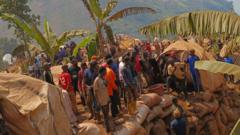In the heart of eastern Democratic Republic of Congo, the Rubaya mine stands as a vital source of coltan ore necessary for the production of mobile phones, recently highlighted in a rare BBC report that showcased the daily toil of over 10,000 workers at the site. Under the control of M23 rebels since April of last year, the mine buzzes with activity as laborers dig, haul, and process the mineral in challenging and dangerous conditions.
The expansive Rubaya mine, located approximately 10km from the town of Rubaya, covers a landscape riddled with extensive pits and tunnels. Miners work diligently, hauling sums of coltan-bearing rock—they know that this labor, while arduous, is their key to survival. Patrice Musafiri, a supervisor at the site, shared, "We have a mining department that regulates safety issues and also resolves internal disputes within the mines."
Experts estimate that the region holds a staggering 15% of the world's coltan supply, making it a significant target for global investors looking to capitalize on its rich resources. However, the backdrop of ongoing conflict and instability complicates the situation. The issuance of a ceasefire deal between the DR Congo and Rwanda—the latter accused of backing M23—has raised questions about what the future holds for both local miners and international interests.
Amidst precarious safety standards, miners like Peter Osiasi emphasize the changes that the mining industry has brought to their personal lives, allowing for rudimentary financial stability. Still, grievances about low wages remain, with calls for improved compensation echoing among workers.
Musafiri believes potential foreign investment should focus not merely on extracting minerals but should also enhance local infrastructure by fostering job creation, education, and healthcare. As international powers like the United States eye the region, Congolese leaders hope to leverage their mineral wealth to gain much-needed support, while still grappling with the current power dynamics and the M23's control.
As discussions for peace continue amidst a complex history of ethnic strife and conflict, the fate of both the Rubaya miners and their communities hangs in the balance. The miners aspire for a resolution that brings an end to violence, allowing them to work safely and earn livelihoods that can sustain their families. "My appeal to fellow young men and our leaders is to keep and maintain peace in our area," Osiasi urged, reflecting the shared hopes of many workers at the mine.


















